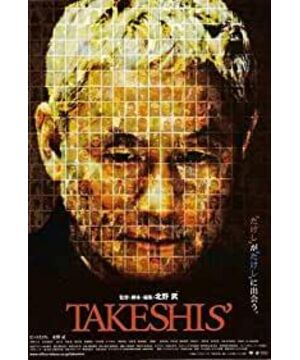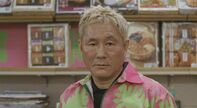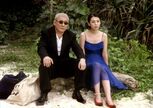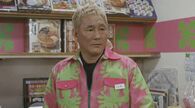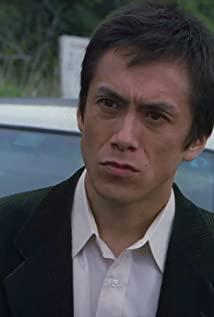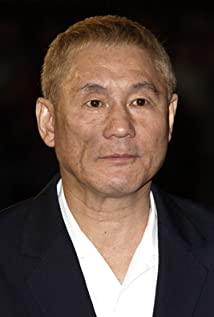Kitano Takeshi Killed Kitano Takeshi
/ Not necessarily a donkey and a donkey In April 2006,
the star "Kitano Takeshi" met the movie fans "Kitano Takeshi" who came to visit "Wu" and signed him; the fan "Take Kitano" worked tirelessly for his ideal of becoming an actor, and finally he got his wish, but went to assassinate the star "Take Kitano"...
1.
Once upon a time, Yasujiro Ozu was not without irony Complaints and self-deprecatingly said that for him, the movie was "just a prostitute in a straw bag, standing on the bridge to drop customers (that's all)."
Looking at the writers and filmmakers in Japan today, it is obvious that they are no longer as timid as Ozu. The so-called "author's film" is to pursue one's own artistic interest arbitrarily, and the "vulgar" feelings of "vulgar" viewers are not considered and cared for. As for making a "prostitute" movie like Ozu, it is speculative and catering to the audience. Entertaining the public is completely mechanical work by Hollywood and the like, and it is detrimental to the name of art.
In recent years, Japanese author films on the stage of Cannes and Venice have become more and more intense, and it is always difficult to reach an agreement with the audience's taste. ", Takashi Miike (I insist on putting this gentleman in the list of writers and directors) "Yizang", "Bury in a Box" to "Monster War", "obscurity" has become synonymous with them, stream of consciousness, cult, broken, ambiguous, It's hard to understand... This is an era of advocating individuality, this is an era of art where subjectivity is paramount, as long as the director's own logic makes sense, as long as he has his own artistic motives, viewing is secondary. It's a bit of a cliché.
Suzuki Kiyoshun and Kurosawa Kiyoshi are academic directors who have weak narrative ability and are good at making films that are difficult for ordinary people to understand, and people like Takashi Miike who are "perverted" in thinking, but, like Takeshi Kitano, who is good at acting is better. The author, who is a director, has a little folk artist's craftsmanship, has always been stable in his works, and is "loved by everyone", why does he recklessly launch the obscure and chaotic works of "Double-faced Kitano Takeshi"?
In September last year, Kitano Musashi tucked into Venice cheekily with "Two Sides Kitano Takeshi", playing the same mysterious role as Kim Ki-duk's "Empty Room" the year before, but his fate and physique were completely different from the former. At that time, the prescient chairman of the film festival, Marco Mueller, spread his hands and said to the media: He came voluntarily, but I didn't ask him to come. It is possible that the meaning of the teasing in the words is to say: he is cheeky and hard-nosed, and there should be no hope of winning the award.
Marco Muller's prophecy soon came true. "Two-sided Takeshi Kitano" was not only famous, but also the Italian fans of Takeshi Kitano were mostly unhappy and full of complaints.
Beginning with "Ferocious Man" in 1989, Kitano Takeshi, who held the guide tube, became famous in Venice with his unique simplified image narrative, which greatly improved the text of the film; at the same time, he completed the violence under the constraints of warmth and beauty. Expressed, embodying the Japanese dual character of "chrysanthemum and sword", and thus received the unanimous nod of Western academies and folks to worship. The turbid and mixed "babble" images like "Double-faced Takeshi Kitano" are unique. It is in sharp contrast with "Zatoichi" which won the Silver Lion Award in 2003.
"Double-Face Kitano Takeshi" is naturally not popular in his hometown. Japanese audiences have a prejudice against Kitano's works. Compared with the elegant and profound Master Kitano, they are obviously more accustomed to the witty, obscene, erotic, and cross talk actor Kitano Joker. He, who was lucky to get a little box office turnaround with "Zatoichi", will continue to be left out under the strong destruction of "Double-Face Kitano Takeshi".
2.
Many viewers frowned and shook their heads at "Double-sided Takeshi Kitano", puzzled. Kitano Takeshi himself also stated rationally, "After all, the plot of this film is a bit confusing, and it is normal for the audience to not understand it."
So, why did Takeshi Kitano arbitrarily make such an embarrassing movie that is unpleasant inside and out? Ignoring the viewer's feelings, isn't it good to continue the filming strategy of "Zatoichi", which is both famous and fortune? Could it be that he wants to learn from Suzuki Kiyoshun, move closer to Takashi Miike, establish his own unfathomable cult thoughts and artistic accomplishment, and add mysticism to his works?
This has to start with "Fireworks", which won the Golden Lion in 1997--
"Hana" is Kitano's seventh directorial work. The Japanese film critic Yodogawa Nagaji praised it for "not only the powerful and intimidating strength of "The Ferocious Man", but also the warmth and tranquility of "That Summer, the Most Tranquil Sea"". It can be said that it is the essence of the first six works, the master of integration. --This is an integration of artistic skills and presentation themes. Here, Kitano's blues-violent flower blooms with her charming beauty, and has already begun to fade. Afterwards, the failure of "Big Brother" soon witnessed the end of Jiang Lang's talent in Kitano-style blues violent aesthetics (for a director who wrote and directed himself, this sign is very conspicuous). He tried to break through the rut, from "Doll" to "Zatoichi", showing a vague intention to return to tradition.
Before interpreting "Double-faced Takeshi Kitano", I would like to talk about an interesting anecdote about Takeshi Kitano and Wong Kar-wai.
It was one day a few years ago when "2046" was still a mystery, Wang Jiawei went to Tokyo on a whim to pay homage to Takeshi Kitano. Movie stories. That is a photo that lingers in my heart, a photo that evokes imagination and gives people a sense of seclusion: Takeshi Kitano, a ragged boy, pedaling a bicycle with a smirk, on the seat behind him, riding a bicycle. Wang Jiawei with black sunglasses and a calm expression with his head turned slightly sideways... I can't help but wonder, where is Takeshi Kitano taking Wang Jiawei? Will Wong Kar Wai learn from Kitano Martial Arts bad?
Today, it seems that Wang Jiawei did not learn badly from Kitano Wu, but Kitano Wu was brought "bad" by Wang Jiawei. "Double-faced Takeshi Kitano" always seems to be somewhat inspired by "2046". How similar are the two creative intentions!
First of all, both of them are the director's personal works, that is, they are made for himself, an account of his own conscience; secondly, both of them are the subject matter of the creator's creative process, they describe the inner feelings of the film artist, and can It is said that the protagonist is the projection of the director himself, especially "Double-faced Takeshi Kitano", which is completely Takeshi Kitano in real life; moreover, both films are like the review and summary of the director's past works.
It is also for this reason that "Double-Faced Kitano Takeshi" suffered a similar fate to "2046"...
3.
In an earlier interview, Takeshi Kitano claimed that "Two Sided Takeshi Kitano" is a summary film, a summary of his previous directing style, and he is bound to seek a change after that.
Regardless of whether he can break through the rut and successfully transform in the future, "Double-Face Takeshi Kitano" has at least completed its due mission. If "Fireworks" is a summary of Kitano's artistic skills and themes, then "Double-Faced Kitano" is undoubtedly a systematic summary of his more than ten years of film creation career.
"Double-faced Takeshi Kitano" does not directly tell any interesting story. If Take Kitano's past works are compared to novels-art practice, "Two-Face Kitano Takeshi" is like a self-examination of the soul of prose-with the meaning of art theory level. In the ambiguous and scattered images of non-linear narratives and broken dreams, Takeshi Kitano reflects on his own artistic journey—and his life.
Now, please follow me into the idea of the movie script, which is the life of Takeshi Kitano -
"Take Kitano" is a big star, riding a Rolls-Royce, revered and arrogant, he and his agent Osugi Rian were removed from the mahjong hall On the movie set, passing by the street ramen restaurant, I plan to use this as a material to make a "Stubborn Dad" movie. The gangsters in the mahjong hall, the young Kabuki father and son who met on the road, begged to perform in his movie. On the movie set, the dragon actor Shinji Tejima brought a fan and asked for his autograph. "Take Kitano" agreed, but he was really taken aback when he saw the face of the other party. The other party not only looked like him, but also had the same surname. Later, "Kitano Takeshi" asked left and right, what kind of work does that person do? Dasugi Lian replied that he works in a convenience store and occasionally runs a part-time job.
Next, "Take Kitano" fell asleep, and the man who was very similar to him ignited the memory-the memory of when he was just a down-and-out actor. In the dream, he used that person's body to return to his past self. As for the occasion of the dream, it was the real scene he experienced during the day--a mahjong parlor, a ramen parlor, a movie studio, as well as his imagined convenience store, apartment, and Some scenes from my past works.
At that time, "Take Kitano" was struggling at the bottom of the society, and was despised, mocked, ignored, and insulted, and lived a life like no other. In the apartment, Terashima Jin led his flamboyant girlfriend to ridicule him; in the convenience store, female customers made things difficult for him; in the audition interview, the examiner disdained him; he was bullied at the mahjong parlor; even went to the ramen restaurant to eat a bowl of noodles, The owner also yelled at him.
The injustice in reality made him furious, and finally broke out. A bag of firearms he accidentally found made him want to take revenge and vent on all the injustices. He shot at the bastards who had bullied him, robbed Shin Terashima's beautiful girlfriend, and robbed the insurance company... Then, he succeeded and set foot on the film industry, and countless flowers and glory followed.
Here, Takeshi Kitano adopts the narrative logic of a dream within a dream, pondering over his past works, and explaining to the world why his films are always filled with so much violence.
In "History of Japanese Films", Iwasaki Chang once speculated on Ito Daisuke's filming of the sword and halberd film: the sense of resistance to order and rights hidden in the depths of the sword and halberd film, just rightly comforted Ito's frustration and resentment at that time; Erotic film director Katsuya Konuma once confessed frankly that SM movies are a wonderful means for him to vent his sensual desires and express his demands.
Kitano's film undoubtedly has such a confession, and he revealed the secret of his success. The clown Kitano Takeshi, who once made countless jokes and brought endless ease and joy to people, secretly had to bear the hardships and pressures behind the stage. All this can be released only by resorting to virtual violent images. Fortunately, his artistic life also blossomed in the rich rendering of violent beauty.
When "Kitano Takeshi" dripped KO of all opponents, he became famous. However, the works since "Hanawa" have probably not been able to break away from the previous model. Takeshi Kitano is more just repeating the past. "Kiujiro's Summer", "Big Brother", "Doll", even he himself has some ego disgusted. So, Kitano Takeshi tried to solve the contradiction and confusion again by relying on violence. He arranged for "Take Kitano" to kill "Take Kitano". Say goodbye to your yesterday in order to seek Nirvana and new life.
View more about Takeshis' reviews


